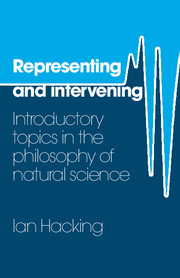Book contents
- Frontmatter
- Acknowledgements
- Contents
- Analytical table of contents
- Preface
- Introduction: Rationality
- Part A Representing
- 1 What is scientific realism?
- 2 Building and causing
- 3 Positivism
- 4 Pragmatism
- 5 Incommensurability
- 6 Reference
- 7 Internal realism
- 8 A surrogate for truth
- Break: Reals and representations
- Part B Intervening
- Further reading
- Index
- Frontmatter
- Acknowledgements
- Contents
- Analytical table of contents
- Preface
- Introduction: Rationality
- Part A Representing
- 1 What is scientific realism?
- 2 Building and causing
- 3 Positivism
- 4 Pragmatism
- 5 Incommensurability
- 6 Reference
- 7 Internal realism
- 8 A surrogate for truth
- Break: Reals and representations
- Part B Intervening
- Further reading
- Index
Summary
If only philosophers of science had never troubled themselves about meaning we should have no doctrine of meaning-incommensurability. As it is, we need an alternative account of meaning which allows that people holding competing or successive theories may still be talking about the same thing. The most viable alternative is Hilary Putnam's. He intended it as a part of his former scientific realism. He has since become increasingly antirealist, but that is a story I reserve for the next chapter. For the present consider his meaning of ‘meaning’.
Sense and reference
The word ‘meaning’ has many uses, many of which are more evocative than precise. Even if we stick to the commonplace meaning of words, as opposed to poems, there are at least two distinct kinds of meaning. They are distinguished in a famous 1892 essay by Gottlob Frege, ‘On sense and reference’.
Consider two different kinds of answer to the question, What do you mean? Suppose I have just told you that the glyptodon brought by Richard Owen from Buenos Aires has now been restored. Most people do not know the meaning of the word ‘glyptodon’ and so may ask, What do you mean?
If we are standing in the museum I may simply point to a largish and preposterously shaped skeleton. That is what I mean. In Frege's parlance, that very skeleton is the reference of my words, ‘The glyptodon brought by Richard Owen from Buenos Aires.’
Information
- Type
- Chapter
- Information
- Representing and InterveningIntroductory Topics in the Philosophy of Natural Science, pp. 75 - 91Publisher: Cambridge University PressPrint publication year: 1983
Accessibility standard: Unknown
Why this information is here
This section outlines the accessibility features of this content - including support for screen readers, full keyboard navigation and high-contrast display options. This may not be relevant for you.Accessibility Information
- 1
- Cited by
